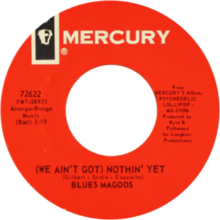
Mathis James Reed was an American blues musician and songwriter. His particular style of electric blues was popular with blues as well as non-blues audiences. Reed's songs such as "Honest I Do" (1957), "Baby What You Want Me to Do" (1960), "Big Boss Man" (1961), and "Bright Lights, Big City" (1961) appeared on both Billboard magazine's rhythm and blues and Hot 100 singles charts.

The Blues Magoos are an American rock group from The Bronx, a borough of New York City, United States. They were at the forefront of the psychedelic music trend, beginning in 1966. They are best known for the hit song "(We Ain't Got) Nothin' Yet", their only single to reach the Billboard top fifty.

David Louis Bartholomew was an American musician, bandleader, composer, arranger, and record producer. He was prominent in the music of New Orleans throughout the second half of the 20th century. Originally a trumpeter, he was active in many musical genres, including rhythm and blues, big band, swing music, rock and roll, New Orleans jazz, and Dixieland. In his induction into the Rock and Roll Hall of Fame, he was cited as a key figure in the transition from jump blues and swing to R&B and as "one of the Crescent City's greatest musicians and a true pioneer in the rock and roll revolution".
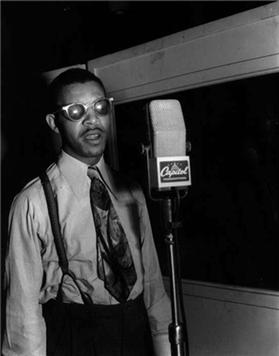
Albert George Hibbler was an American baritone vocalist, who sang with Duke Ellington's orchestra before having several pop hits as a solo artist. Some of Hibbler's singing is classified as rhythm and blues, but he is best seen as a bridge between R&B and traditional pop music. According to one authority, "Hibbler cannot be regarded as a jazz singer but as an exceptionally good interpreter of twentieth-century popular songs who happened to work with some of the best jazz musicians of the time."

"(Get Your Kicks on) Route 66" is a popular rhythm and blues song, composed in 1946 by American songwriter Bobby Troup. The lyrics relate a westward roadtrip on U.S. Route 66, a highway which traversed the western two-thirds of the U.S. from Chicago, Illinois, to Los Angeles, California. The song became a standard, with several renditions appearing on the record charts.
"Deep Purple" was the biggest hit written by pianist Peter DeRose, who broadcast, 1923 to 1939, with May Singhi as "The Sweethearts of the Air" on the NBC radio network. "Deep Purple" was published in 1933 as a piano composition. The following year, Paul Whiteman had it scored for his suave "big band" orchestra that was "making a lady out of jazz" in Whiteman's phrase. "Deep Purple" became so popular in sheet music sales that Mitchell Parish added lyrics in 1938.

Picturesque Matchstickable Messages from the Status Quo is the debut studio album by the English rock band Status Quo, released in September 1968. It features several covers, including "Green Tambourine" by The Lemon Pipers.
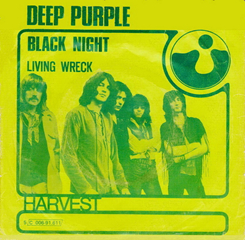
"Black Night" is a song by British hard rock band Deep Purple, released as a single in June 1970 and later included on the 25th Anniversary version of their 1970 studio album, Deep Purple in Rock. It became a hit following its release, peaking at No. 2 on UK charts, and remains Deep Purple's highest charting UK single. It topped the charts in Switzerland, and is one of only two singles from the band to chart in Ireland, peaking at No. 4, thus making it the group's only Irish Top 10 hit. It was also the second non-album single penned by the band and also reached number 6 in South Africa.

"Lucille" is a 1957 rock and roll song originally recorded by American musician Little Richard. Released on Specialty Records in February 1957, the single reached number 1 on the Billboard R&B chart, 21 on the US pop chart, and number 10 on the UK chart. It was composed by Albert Collins and Little Richard. First pressings of Specialty 78rpm credit Collins as the sole writer. Little Richard bought half of the song's rights while Collins was in Louisiana State Penitentiary.

"Only Women Bleed" is a song by American rock singer Alice Cooper, released on his debut solo studio album Welcome to My Nightmare (1975). It was written by Cooper and Dick Wagner, and was the second single from the album to be released.
"You Ain't Seen Nothin' Yet" and similar can refer to:
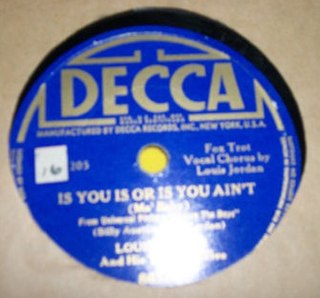
"Is You Is or Is You Ain't My Baby" is a song written by Louis Jordan and Billy Austin. The song's first recording, by Jordan, was made on October 4, 1943. It was released as the B-side of a single with "G.I. Jive" with the title "Is You Is or Is You Ain't ". The song reached No. 1 on the US folk/country charts, number two for three weeks on the pop chart, and number three on the R&B chart.

Psychedelic Lollipop is the debut album by the American rock band the Blues Magoos, and is one of the first records to have the word “psychedelic” on the sleeve. Their single “(We Ain't Got) Nothin' Yet” was their most successful effort, rising into the Top 10 on many national charts. Guitarist “Peppy” Theilhelm was 16 years old at the time of the single’s release. The band recorded five more albums with various lineups, none reaching the success of Psychedelic Lollipop.
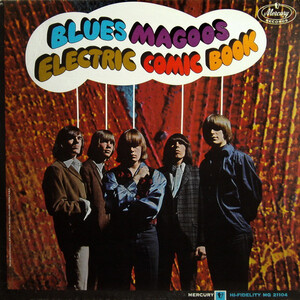
Electric Comic Book is the second album by the American rock band the Blues Magoos, the follow-up to their successful debut release Psychedelic Lollipop. The psychedelic garage rock style is followed again on this release but without a high-charting single. A couple of tracks, "Intermission" and "That's All Folks" showcase the band's bizarre sense of humor.
"I'll Go Crazy" is a rhythm and blues song recorded by James Brown and The Famous Flames. Released as a single in 1960, it was Brown's fourth R&B hit, charting at #15. Brown and the Flames also performed it as the first song on their 1963 album Live at the Apollo.

"Never Comes the Day" is a 1969 single by the progressive rock band the Moody Blues. It was written by band member Justin Hayward, and was the only single released from their 1969 album On the Threshold of a Dream.
Titus Lee Turner was an American R&B and East Coast blues singer and songwriter. His best-remembered recordings are "We Told You Not to Marry" and "Sound-Off". He also wrote "Leave My Kitten Alone", "Sticks and Stones" and "Tell Me Why".
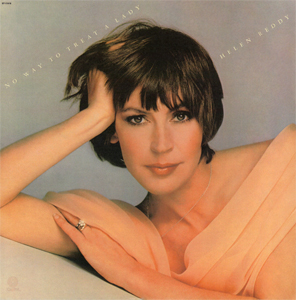
No Way to Treat a Lady is the seventh studio album by Australian-American pop singer Helen Reddy that was released in the summer of 1975 by Capitol Records and found Reddy tackling country pop, bossa nova and blues. The album debuted on Billboard's Top LP's & Tapes chart in the issue dated July 12, 1975, and peaked at number 11 over the course of 34 weeks, and on the album chart in Canada's RPM magazine it got as high as number 13. On January 19, 1976, the Recording Industry Association of America awarded the album with Gold certification for sales of 500,000 copies in the United States, and on August 23, 2005, it was released for the first time on compact disc as one of two albums on one CD, the other album being her 1976 release, Music, Music.

Basic Blues Magoos is the third album by the American rock band the Blues Magoos. It was released on Mercury Records in May 1968. The album saw the group transitioning from psychedelia back to their blues rock roots. Though the album has gained more favor over the years, it was received as a disappointment upon its original distribution and failed to chart.
"Ain't Got No Home" is a song written and originally recorded by American rhythm-and-blues singer and pianist Clarence "Frogman" Henry. It was released as a single in the United States on December 15, 1956.
